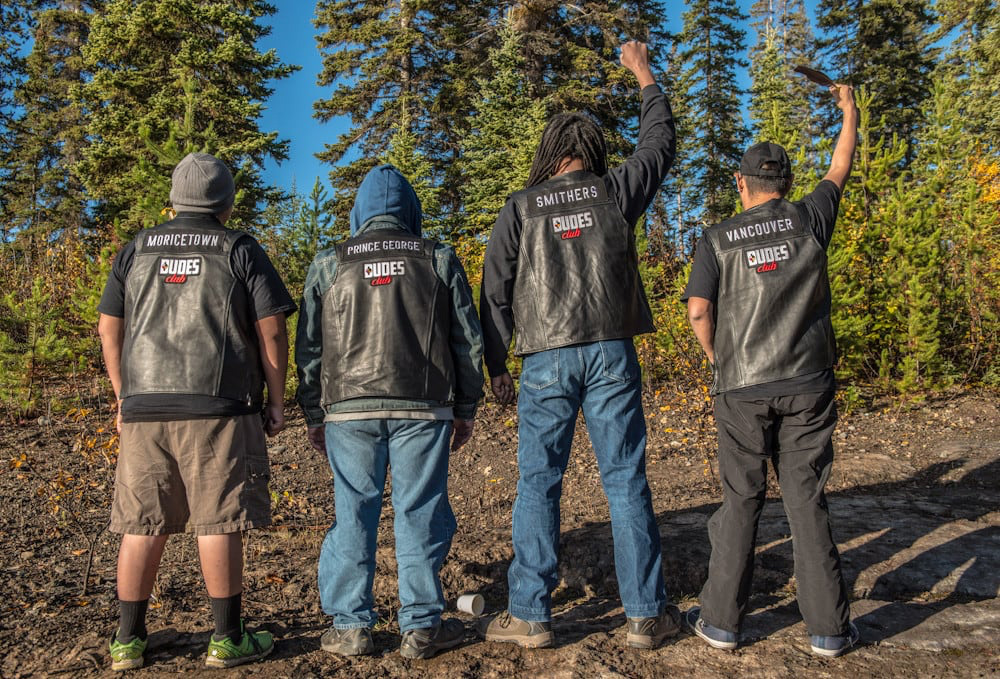Why do so many men grow moustaches every November? It started in Australia in 2003 when a small group of men grew moustaches to support men’s health and prostate cancer. From humble beginnings, the Movember movement has focused important international attention on issues like men’s mental health and suicide prevention, as well as prostate and testicular cancer.
But can a moustache save a life? According to Dudes Club members, it can.
Dudes Club is an innovative, community-driven men’s health program incorporating Indigenous approaches to healing and wellness. With help from Movember, a three-year research project with the Dudes Club demonstrated how a grassroots initiative could be mobilized to work by, for and with Indigenous men.
Research shows that men in general are less likely to seek medical attention than women in addition to being three times more likely than women to die by suicide.
Indigenous men’s health is further impacted by a lack of research on health services directed specifically at Indigenous men. In addition to the impacts of harmful masculine norms such as being “strong and silent,” independent and emotionless, Indigenous men endure the impacts of historical injustices through ongoing experiences of racism, violence and social exclusion.
As an Indigenous health researcher, I am interested in community health and well-being, particularly in urban areas. I study gendered experiences of colonization and their impacts on Indigenous peoples and communities. Through my research with Dudes Club, I worked with community partners, Elders, health-care practitioners and Dudes Club members to better understand Indigenous men’s health and extend the model throughout British Columbia.
Dudes Club started in Vancouver Native Health Society in 2010. It has since grown into a national model for men’s health and well-being with 40 sites throughout B.C. and two nationally.
During weekly “think tanks” at the Vancouver club, members choose topics for biweekly sessions. This gives members a sense of ownership over the process and empowers them to take control of their own health. The presence of a health professional at most sites makes health information accessible for men who don’t usually seek out such information.
Safety, trust and connection
A survey of 150 men at the Vancouver Dudes Club demonstrated that most came from a context of disenfranchisement, such as unstable housing, unemployment and poverty.
In addition, many of the men live with complex histories of trauma, mental health and/or substance use issues. In the face of structural and systemic barriers, the research showed how important community connection and belonging are to mental, physical and emotional health.
Fourteen focus groups were conducted with men in Vancouver, Prince George and Smithers. In these groups, men described Dudes Club as a place where they can feel purpose and belonging, where they can work together to build peer support networks and engage in community advocacy. The research demonstrated that safety and trust are crucial for men taking ownership over their health. Dudes Club builds safety and trust because it is confidential, includes health professionals who understand member’s reality, and encourages strong peer relationships where respectful listening is the norm.
For men who attend often, the Dudes Club makes them feel more connected to others and improves their quality of life, meaning those who attend more often benefit more from the program. One Elder described Dudes Club as a “safe haven.” The presence of Elders at Dudes Clubs is important, not only for the cultural knowledge they share, but for the humour and love they bring to the gatherings.
Its informal motto — “leave your armour at the door” — demonstrates that Dudes Club is a safe space in which to challenge ideas of masculinity that say men have to be the “tough guy.” These ideas have prevented men from seeking health information and created disparities that have persisted for generations.
The value of grassroots organizing
While Dudes Club is available to all men, many Indigenous men (63 per cent in the Vancouver Dudes Club) access the program through a partnership with the First Nations Health Authority.
Ultimately, the Dudes Club is not just about men’s health and well-being. It is about the health of communities, women, youth, children and Elders. Dudes Club reminds men that they are part of a community that values them even as mainstream social supports and health services fail them and their communities over and over again.
Dudes Club holds great value as a grassroots health promotion and community wellness model for all people who identify as male. It is a simple yet powerful example of grassroots community organizing that is helping us better understand how intersecting factors (including gender, culture and experiences of colonization) can impact people differently.
So, yes — moustaches can save lives.
![]()
![]()
Read more: Indigenous, Health

















Tyee Commenting Guidelines
Comments that violate guidelines risk being deleted, and violations may result in a temporary or permanent user ban. Maintain the spirit of good conversation to stay in the discussion.
*Please note The Tyee is not a forum for spreading misinformation about COVID-19, denying its existence or minimizing its risk to public health.
Do:
Do not: